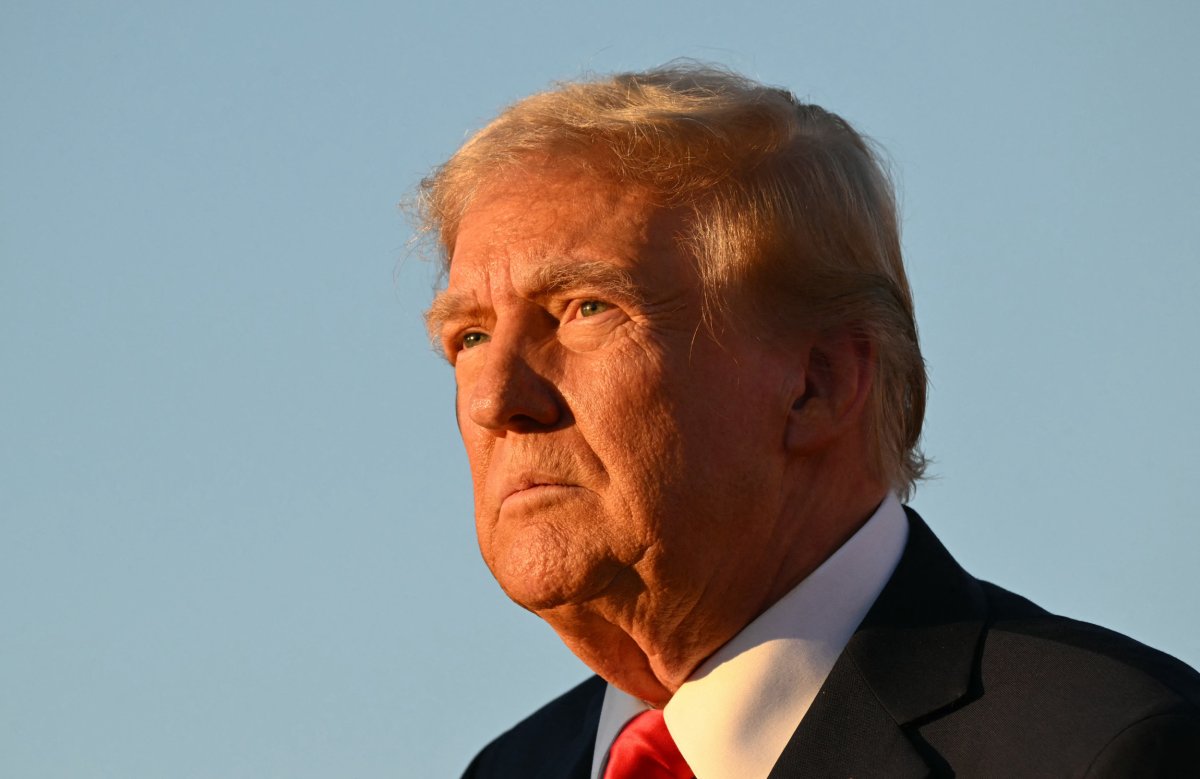As we close in on Nov. 5 and Judgment Day for American democracy, the specter of Benito Mussolini's seizure of power in Italy a century ago has been keeping me up at night. The similarities with where we find ourselves in the waning days of the 2024 presidential campaign are too foreboding, and too frightening, to be ignored. Former President Donald Trump, after all, has all the hallmarks of a Mussolini in the making. Which should be reason enough to make any American with even a modicum of reverence for the U.S. Constitution vote for Vice President Kamala Harris.
A fulcrum of Trump's immediate agenda appears to be his rage against his political opponents whom he calls "the enemy from within." Referring to the likes of former House Speaker Nancy Pelosi and Rep. Adam Schiff (D-CA) as "evil" and "sick people, radical left lunatics," he said on Fox News' "Sunday Morning Futures" that they "should be very easily handled by, if necessary, by National Guard, or if really necessary, by the military."
Let's let this sink in. The former president is announcing without any ifs or buts that he would be willing to use the U.S. military domestically as his personal goon force against U.S. citizens with whom he wishes to settle political accounts.

He has a ready-made tool at his disposal. There is no reason to believe that if he is re-elected, Trump will not try to avail himself of the Insurrection Act to go after his enemies. This particular statute of 1807 vintage—10 U.S.C. §§ 331-335—allows a president to "call into Federal service such of the militia of any State, and use such of the armed forces, as he considers necessary" to suppress an insurrection or rebellion, or whatever he might decide to designate as such.
And this time around, you can be sure that there will be no one in the administration like former secretaries of Defense James Mattis or Mark Esper, or former White House Chief of Staff John F. Kelly, to put the brakes, any brakes, on such an abhorrent scheme.
"The lesson the former president learned from his first term is don't put guys like me ... in those jobs," Kelly told The Washington Post last November. "The lesson he learned was to find sycophants."
One such sycophant is almost certain to be Jeffrey Clark, the assistant attorney general whom Trump tried but failed to install as the head of the Justice Department after losing the 2020 election. Pat Philbin, Trump's deputy White House counsel testified this past March before the D.C. Bar's Board of Professional Responsibility that when he told Clark in early January 2021 that attempts to overturn the outcome of the election would lead to "riots in every major city in the country and it was not an outcome the country would accept," Clark replied: "Well, Pat, that's what the Insurrection Act is for."
Why does all this bring Mussolini to mind? Because the execution of such a Trumpian second term agenda would be inspired by and modeled on the Italian fascist leader's actions after becoming both prime minister and minister of the interior of Italy in 1922. In the latter capacity, he controlled the Italian police and used them to arrest his political enemies—largely communists, socialists, and anarchists—while his black-shirt squadristi, as the Italian fascist paramilitary gangs were known, continued to kill, brutalize, and generally instill a debilitating fear among the Italian public as a whole. This tactic proved to be a winner.
Within a matter of months following the assassination of the socialist opposition leader Giacomo Matteotti on June 10, 1924, by members of Mussolini's private secret police operating out of his Interior Ministry, it became evident that the man known as Il Duce had successfully placed himself beyond any judicial or parliamentary limitations on his absolute and unfettered power.
Addressing parliament on Jan. 3, 1925, in what The New York Times called "the greatest triumph of Mussolini's whole political career," he reacted furiously to a memorandum authored by a more "moderate" fascist, Cesare Rossi, that sought to hold him responsible for Matteotti's murder. Instead, Mussolini declared that "the opposition describes us as an army of bandits encamped in Italy. We have swallowed their insults and allowed them to call us brigands and assassins. Now before the Chamber, before the whole nation and before God, I alone assume full personal, political, moral and historical responsibility for everything that has occurred in Italy. If Fascism is an association of malefactors, then let it be known that I am head of this association of malefactors."
Mussolini's words were met with resounding applause. In its wake, he became Italy's absolute dictator at a time when Adolf Hitler, who would use this particular playbook in Germany eight years later, was still a relatively minor Bavarian political figure, having only recently been released from Landsberg Prison after his failed Munich Beer Hall Putsch. With all parliamentary and judicial guardrails gone, Mussolini was able to expel his opponents from Parliament, have the more vocal of them arrested, and quash any political dissent going forward.
"A series of assassination attempts against the new autocrat led to the Law for the Defense of the State (1925-1926) that created a secret police . . . and banned strikes, political parties, and more," writes historian Ruth Ben-Ghiat in her simultaneously fascinating and disturbingly ominous book, Strongmen: Mussolini to the Present (Norton, 2021). "Anti-Fascists fled abroad or went into hiding, and many were killed . . .. To take care of unfinished business from the Matteotti killing, Mussolini pardoned all political prisoners in July 1925 and fired the magistrate overseeing the ongoing Matteotti investigation. . .. Mussolini lacked one last guarantee of his survival: international legitimation and economic aid. In 1926, J.P. Morgan partner Thomas Lamont . . . brokered a $100 million loan from the American government to the regime."
"In less than three years," Ben Ghiat continues, "Mussolini had destroyed Italian democracy, bought off elites, and domesticated the press and labor."
Does anyone doubt that this is precisely what Trump would try to do if elected to a second term?
Just like Mussolini made the squadristi kosher, as it were, in 1920s Italy, Trump has been working overtime to depict his goon squad thugs who perpetrated the Jan. 6, 2021, insurrection in a favorable light, promising to pardon most if not all of those convicted or under indictment if given the chance to do so.
Why should anyone have any doubt that just as Trump incited his mob to converge on the Capitol on Jan. 6 and did nothing to restrain their violence once they got there, he would happily incite them and others like them, together with "the military," on real or perceived enemies or adversaries?
"When the men with guns who have always claimed to be against the system start wearing uniforms and marching with torches and pictures of a leader," observes Yale historian Timothy Snider, "the end is nigh. When the pro-leader paramilitary and the official police and military intermingle, the end has come." This is precisely the prospective cataclysm that Trump's above-quoted comments on the Fox News program evoke.
"I think this issue of using the military on—to go after—American citizens is one of those things I think is a very, very bad thing — even to say it for political purposes to get elected—I think it's a very, very bad thing, let alone actually doing it," Kelly says in a bombshell on-the-record interview with The New York Times.
A reelected Trump is guaranteed to oust every last Justice Department official involved in any of the criminal cases against him. And Trump already has his international and economic legitimation in place. Russian President Vladimir Putin, Hungarian Prime Minister Victor Orban, and Israeli Prime Minister Benjamin Netanyahu are chomping at the bit to provide him with the former, while billionaires Elon Musk, Miriam Adelson, and Dick Uihlein have already shelled out more than $220 million to put Trump back in the White House.
Still, some will argue, the United States of 2024 is not the Italy of 1924. True enough, but then again, no one in 1924 could foresee the catastrophic and unprecedented consequences of allowing Mussolini, and subsequently Hitler, to wield power unchecked. We, on the other hand, have no such excuse.
Prominent Republicans led by former Vice President Dick Cheney and former U.S. representatives Liz Cheney and Adam Kinziger, and including more than 100 senior members of past Republican administrations, have repudiated Trump and are endorsing Vice President Kamala Harris.
Trump's own former vice president, Mike Pence, who narrowly escaped becoming a contemporary Matteotti on Jan. 6, is refusing to support his former boss. So is Sen. Mitt Romney (R-UT), the 2012 Republican presidential nominee. Kelly says that Trump "falls into the general definition of fascist, for sure." And retired General Mark Milley, chairman of the Joint Chiefs of Staff from 2019 to 2023, told author Bob Woodward that Trump is "fascist to the core" and "the most dangerous person to this country."
Perhaps the constitutional five-alarm-fire warning all of them are sounding and the ever-widening shadows Mussolini's ghost is casting will cause enough Americans to make sure that fascist Italy's past, Nazi Germany's past, and Putin's Russian present do not become our future.
Menachem Z. Rosensaft is adjunct professor of law at Cornell Law School and lecturer-in-law at Columbia Law School. He is the author of the forthcoming Burning Psalms: Confronting Adonai after Auschwitz (Ben Yehuda Press, 2025).
The views expressed in this article are the writer's own.




















 English (US) ·
English (US) ·